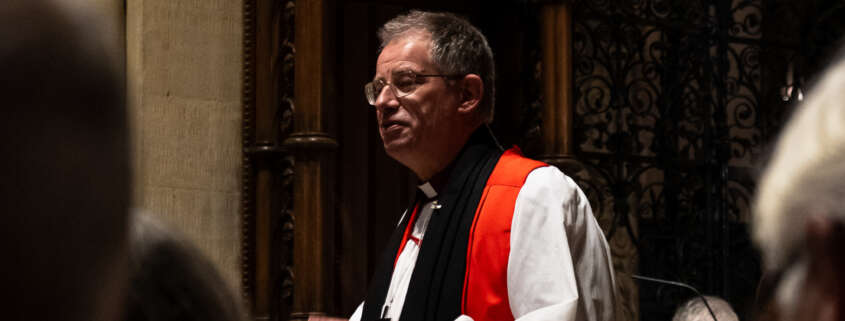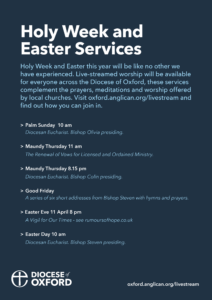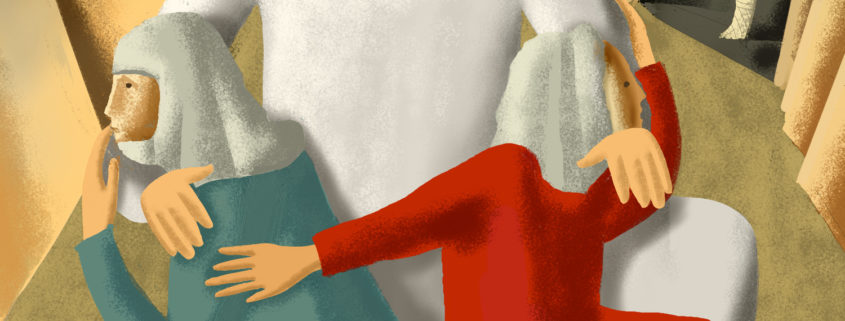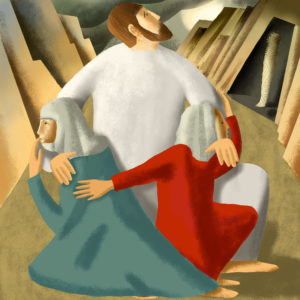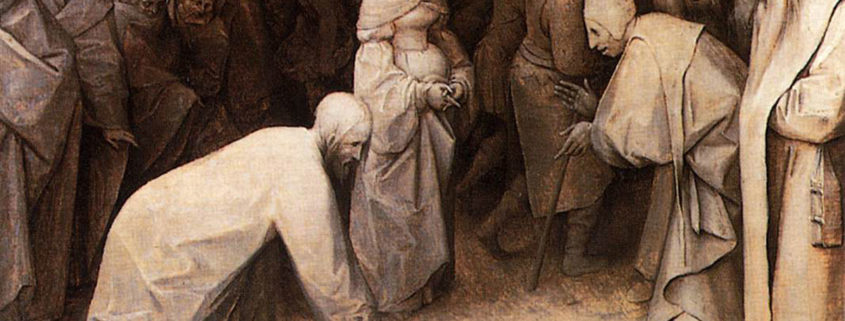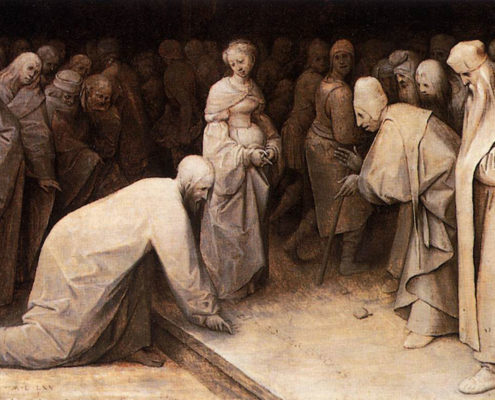Come and see…
A sermon for the beginning of Lent, preached in St Mary’s Iffley and Keble College Chapel on 11 February. The readings for the day were 2 Kings 2.1-12; 2 Corinthians 4.3-6 and Mark 2.1-9.
On Monday I had an appointment in central Oxford arranged at short notice. The instructions on location in my diary are normally an address or a postcode. But these instructions read as follows: Big Green door left of Ravenscroft and Ede, High Street. This sounds more like an extract from a John Le Carre novel or maybe Harry Potter than a normal Bishop’s diary.
I walked down the High Street with moments to spare, only half remembering where Ravenscroft and Ede is and concerned that I might miss the big green door because I’m colourblind. Thankfully my host was there to meet me. We stepped inside between the shop fronts, through a door, an alleyway and a gate. Behind the shop front, as so often in Oxford, we entered another world: quadrangles and staircases; modern buildings; student rooms; a maze of corridors. I had walked down the High Street scores of time, never realising the hidden world beyond.
Oxford lends itself to hidden unseen worlds. All is not as it seems from Lewis Carol and C.S. Lewis to Colin Dexter and Philip Pullman. Whole departments for the arts and sciences are hidden inside the doors of terraced houses. Beautiful gardens are locked inside forbidding walls. The whole architecture of the city reminds me over and again that there is more to almost everything than meets the eye. That architecture and geography springs in turn from the deep Christian roots of the city. The geometry of our faith invites us to come deeper, to explore unseen worlds, to take the next step on the journey.
Our Old Testament reading uses geography to invite us to explore unseen worlds. Elisha follows Elijah through places which have deep meaning in Israel’s story: to Gilgal and Bethel and the Jordan back into the wilderness. Once there Elisha catches a vision of an unseen world beyond this world: a world of the spirit; a world of eternity. Elisha’s will go on to draw immense strength and power from this vision of eternity to bring change in his own generation.
Paul in 2 Corinthians tells us in many different ways that there is more to this faith of ours and to Jesus than we have yet seen and that the world has seen. The gospel is veiled, hidden away. It is possible to walk past it scores of times and never understand it. The god of this world has blinded the minds of the unbelievers so that they cannot see the light of the gospel. Even those who are Christians can lose sight of the wonder and the glory of Christ who is the image of God.
And that glory is revealed most clearly in our gospel reading, Mark’s account of the transfiguration. Jesus takes Peter, James and John apart. They have travelled with him, listened to his wisdom, seen the feeding of the five thousand and the stilling of the storm, witnessed countless acts of kindness yet still they have no idea of the person he is. Their minds cannot embrace the scale and depth and mystery and majesty: the glory of Christ who is the image of God.
And so for a moment they pass through the door. Their eyes are opened as they climb the high mountain. They see him through a different glass: neither microscope nor telescope but spectacles.
Some years ago, my son bought me a special pair of spectacles which aim to correct colour blindness, so I that I could tell the difference between red and green. I had visions of being able to see a glorious range of colours instead of the colours I can see. Sadly they don’t work that well for me.
But it was something like this effect multiplied a hundred fold for Peter, James and John. They see the glory of the Christ who is the image of God. He is transfigured. The Greek word is metamorphosised: the transition from a chrysalis to a glorious butterfly. His clothes became dazzling white. They see part of the company of heaven, represented by Moses and Elijah. They see there is one here who is greater than the law and the prophets. They hear a voice from heaven, echoing the voice at Jesus baptism which answers the deepest question in the gospel: who is this Jesus?
“This is my Son, the Beloved, listen to him!”
The curtain is drawn back. There is a glimpse of eternity. Only here on the mountain. But a glimpse which will shape their lives for ever; a vision which will give them the power to change the world for ever. The glory of Christ who is the image of God.
Too easily we lose this vision of deeper realities and other worlds as the disciples did when they came down the mountain. We need still times in our days when we pray and ponder God’s word. We need a set time each week when we come apart to be with Christ, to reflect on Scripture; to receive the sacrament; to be in Holy Communion. We need a time in the year when we travel up the mountain to with Jesus, seeking that clearer picture of the glory of Christ who is the image of God. That season each year is the season of Lent, which begins of course this coming Wednesday.
One of the most wonderful and profound invitations in the gospel recurs at the beginning of John. Two reticent disciples begin to follow behind Jesus. Jesus turns and sees them following and begins as Jesus often does with a question. What are you looking for?
They stammer out a reply: Rabbi where are you staying? They see him only as a teacher. Jesus gives this most beautiful invitation: Come and see. He opens a door to another world.
This Lent as every Lent we are echoing Jesus’ invitation to the whole Diocese within the Church and beyond it to Come and See. Use this season to come deeper into faith, to discover the glory of Christ who is the image of God. Use this season to explore faith perhaps for the first time. Register on our website and we will send you daily reflections by audio and email and short videos each Sunday. This year we are exploring the Way of Love: Jesus great summary of the law.
There is more behind the green door than we will ever see or understand. Whole worlds are waiting to be explored. The vision we see there will give power and strength and joy for this life and the next. The glory of Christ who is the image of God. Come and see.

